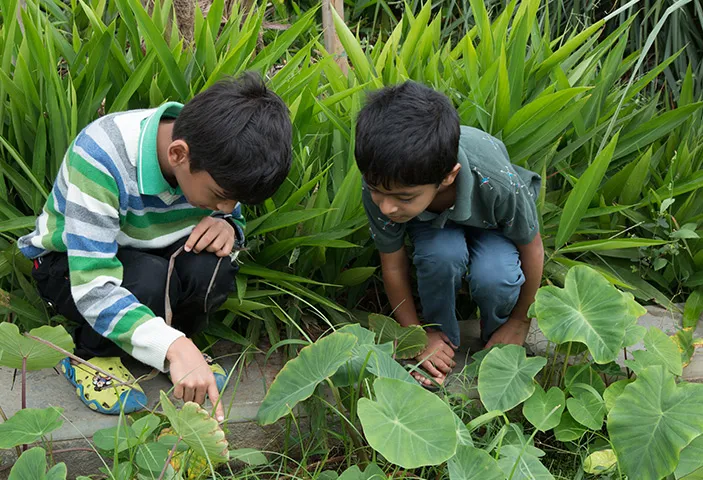 Contact us
Contact usIntent
Community
Studio Organo Concepts
About Us
Subsidaries
Studio Organo
TS RERA No.P02400003403.
TS RERA No.P02400003403.

Whether you grew up in a village, a suburb, or in a big city, you probably spent a lot of time playing outside, getting dirty, and coming home happy. Maybe you watched ants making anthills in your backyard, climbed trees in the park, or simply lay on the grass observing the drifting clouds. Sadly, young children of this digital world do not have as many direct experiences with nature as we had and it's definitely taking a toll, direct or indirect.
This disconnect from the natural world is creating adverse effects in both mind and body. Most of the kids these days have scheduled play dates, join an organized sport on a manicured field, or disappear into their room alone to enjoy a computer game or TV.
Why should children be in nature?
Being in an unstructured environment or nature presents children with an opportunity to explore and learn through observation, experimentation, and reflection. The natural world is an enormous, open-ended knowledge laboratory. Children are natural scientists and love to experience the sights, smells, sounds, and forms of the outdoors. In nature, children tend to think, question, and make hypotheses with their curious minds. Whether they’re judging the distance between two rocks before jumping or considering where insects go in the winter, children are constantly thinking when they’re in nature. These adventures offer real, authentic learning as nothing else can. As children take chances, try and fail, and try repeatedly, they gain resilience and confidence.
Being outside feels good. Children are free to explore, move around, and make noise - all refreshing forms of self-expression that are often restrained indoors. Moreover, nature enhances the feeling of peace and often brings out nurturing characteristics in children. Many hyperactive children slow down to dig a hole in the sand, watch a ladybug crawl, or spend focused time playing with a stick in a mud puddle. The fresh air of the natural world is refreshing and offers boundless possibilities for physical activity, which, in turn, develops strong bodies. Exposure to sunlight helps in receiving vitamin D which has several positive advantages, including a strong immune system. Outdoor play also enables a child to be more physically active than indoor play, potentially burning more calories and contributing positively to a child’s overall health.
The surrounding in which children are growing plays a significant part in re-establishing the lost connection with nature. As we all understand, our children are future stewards of the earth. In order to raise adults who are enthusiastic about preserving the environment and protecting our planet, they must first develop a profound love for it. The only way to facilitate children to grow content in nature is to open the door and let them out to explore the wonder and awe of the natural world.
